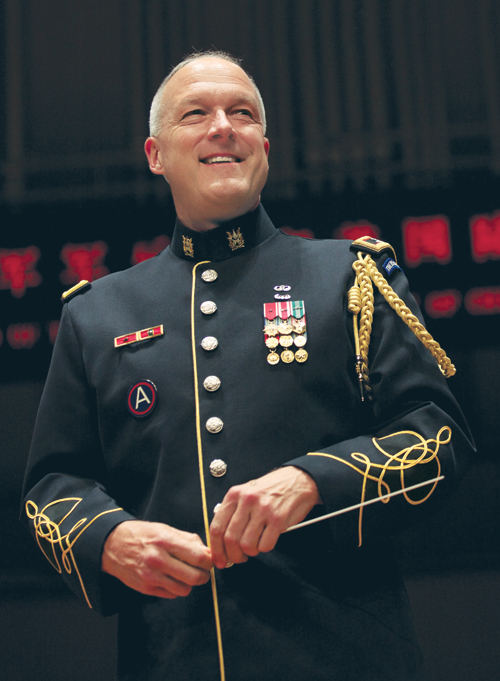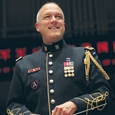
Colonel Thomas H. Palmatier, Leader and Commander of the United States Army Band since August 2011, relinquished the conductor’s baton of the premier musical organization of the United States Army in December 2014, ending a brilliant 37-year career as a military musician.
Originally from Ballston Spa, New York, he is the eldest son of Harold and Marjorie Palmatier, who took their then nine-year-old son to a military band concert at the Saratoga Performing Arts Center in Upstate New York. After the concert, Marjorie Palmatier recalls a young Tom declaring, “I’d like to do that someday.” He began his musical training in elementary school on the trumpet. Says Palmatier, “I think there was a magic moment when I was in fifth grade band, where Anthony Maiello was my band director. It was his first year teaching. I was so struck by how passionate he was about what he did. It left an incredible impression on me. I didn’t really understand it all at that young age, but I knew I wanted to have that same passion.” In sixth grade, Palmatier switched to tuba.
“In my high school years it hit me that this was what I wanted to spend my life doing. I was encouraged by great music educators. My advice to high school students today would be to be open to listening to your teachers. I am where I am today because of little tidbits that were dropped by music educators over the years.”
Following graduation in 1972 from Burnt Hills-Ballston Lake High School, Palmatier attended the Crane School of Music in Potsdam, New York, where he earned a bachelor’s degree in music education, magna cum laude, in 1976. Palmatier also earned a Master of Fine Arts degree in Music from Truman State University in Kirksville, Missouri and a Master of Strategic Studies degree from the U.S. Army War College at Fort McNair in Washington, DC.
One of the things that drew Palmatier to military service was living up to his father’s legacy by following in his footsteps. “Like millions of Americans, he served in WWII and I always aspired to serve my nation as he did.” After graduating from Truman State in 1977, Palmatier enlisted as a private in the U.S. Army with the designation to become an Army Bandsman. After completing Basic Combat Training and the Army’s Advanced Individual Training, he reported to the Presidio, San Francisco, California, the home of the Sixth Army Band, for his first assignment as a tuba player.
Palmatier received some excellent advice in his early 20s. “An old grizzled teacher just said, ‘Do the very best at whatever you’re doing, and other people will take care of you.’ Sometimes I see young people, and they feel like they need to have their whole life mapped out. If they work hard and do their best at whatever they’re doing, doors will open up.” Taking this advice to heart, Palmatier quickly earned leadership positions and was then selected for advanced training at the Armed Forces School of Music near Norfolk, Virginia.
Palmatier’s tenure as a student at the Armed Forces School of Music was unprecedented. Consecutively, he enrolled in the Group Leader, Enlisted Bandleader, and Warrant Officer Bandmaster courses, and was designated Honor Graduate of all three. This led to an early appointment as a Warrant Officer Bandmaster in 1981, with less than four years of service.
His long and distinguished career as a leader in Army Music eventually led him to command The United States Army Band, the Army’s flagship musical organization in the nation’s capital. As leader and commander of this elite unit, Col. Palmatier served as musical advisor to the White House, the Department of Defense, and the State Department on all national and international military music affairs. He has participated as either a leader or staff planner for five presidential inaugurations between 1989 and 2013. Under his command, various ensembles that make up the U.S. Army Band have performed at the Norwegian Military Tattoo, the Midwest Band and Orchestra Clinic, and on a historic goodwill mission to China in 2012.
One of the great privileges of performing in a military ensemble is participating in many significant events of national importance. For Palmatier, whose career has taken him to 49 different countries, there have many great moments. “The very first concert I conducted with the U.S. Army Band on the steps of the Capitol during my first assignment in Washington in 1988 was an amazing moment. So was leading the U.S. Army Europe Band through the streets of Moscow on the 60th anniversary of V-E Day in 2005, and ceremonies at Normandy, France. There were well over a million Muscovites along the street, and to be able to march through that city behind the American flag was an overwhelming experience.
“That was the most historic experience, but it is the wonderful private moments musicians get to have when you realize that maybe your music touched somebody, and you were a small part of that. It’s working with a junior high or middle school band on one of the many clinics we do and seeing the light go on in a couple students’ eyes. The really cherished memories are those personal connections with young musicians.”
On his work in clinics, Palmatier says, “It is so important to never stop trying to get better, no matter what level you’re at. We do a lot of clinics in the army band. School groups come in, and we’ll offer them clinics. Sometimes the school directors act embarrassed, saying ‘I know I’m not good enough.’ The truth is that none of us are good enough. Let’s recognize that we’re all in this together, and ask for help.
“I still take conducting lessons, watch video tapes, read and study, and try to improve the things I don’t do well. It is a lifelong quest for self improvement. I think young people often don’t realize how empathetic and helpful our peers and potential mentors can be. As a young conductor, I was intimidated to ask for help. Then one day, I was in a car with Francis McBeth for a hour. He needed a ride somewhere and I volunteered. I found out then what an incredible person McBeth was; he was just a music teacher who wanted to teach. Reach out to people who you may think are above your level. They’ll love to talk with you. Harry Begian, one of the giants of the band world, was so encouraging of my efforts to try to improve. He always treated me as a colleague even though he was way up there and I was way down here.”
Throughout his more than three and a half decades of distinguished service in the U.S. Army, Col. Palmatier has received numerous military honors, including the Legion of Merit with two Oak Leaf Clusters, seven awards of the Meritorious Service Medal, the Army Commendation Medal with three Oak Leaf Clusters, the Joint Services Achievement Medal, and the Army Achievement Medal with one Oak Leaf Cluster. He was the first Army Band Officer to earn both the Parachutist and Air Assault Badges and earned the right to wear a combat patch for service in El Salvador and later in Iraq. In 2012, Palmatier was named a Distinguished Member of the Regiment for the Adjutant General’s Corps by the Secretary of the Army.
Colonel Palmatier is retiring to the Norfolk area and already has all kinds of guest conducting, honor bands, and clinics lined up. “Throughout my military career, I’ve tried to take as many opportunities to work with young people as possible. One thing that can happen to a military band conductor, because our musicians are so wonderful, is that we start to think we’re way better than we are. It can be easy to be lulled into thinking you’re a great conductor because your groups sound so fantastic. When you work with a middle school band, that’s when you find out if you can teach and if you can inspire people to make good music. I have tried for decades to do that as often as possible to ensure that I don’t get lulled into thinking that I’m better than I am. Because of my military duties, I have had to say no to such requests more often than I would like to. I am going to be saying yes much more often.”
* * *
Colonel Palmatier’s Favorites
We asked Colonel Palmatier what might be on a concert of his favorite compositions. Here are some of his ideas.
I love great transcriptions and find Mark Hindsley’s transcription of Polovetsian Dances particularly compelling. The new Paul Lavender transcription of Pictures at an Exhibition is absolutely spectacular.
I am a big fan of the music of Philip Sparke, because I think he writes music that people want to play and people want to hear. I think his Sinfonietta #2 is one of the most beautiful pieces of band music ever written.
That concert would have to include a couple marches, because I think marches were what bands were created to play. I might choose Liberty Bell and The Gallant Seventh.
Recently the army band recorded a collection called New American Masters, which consisted of new compositions that we felt were going to be around for a while. We played a piece by Julie Giroux called Riften Wed. The more you play it, the more you just love it.





